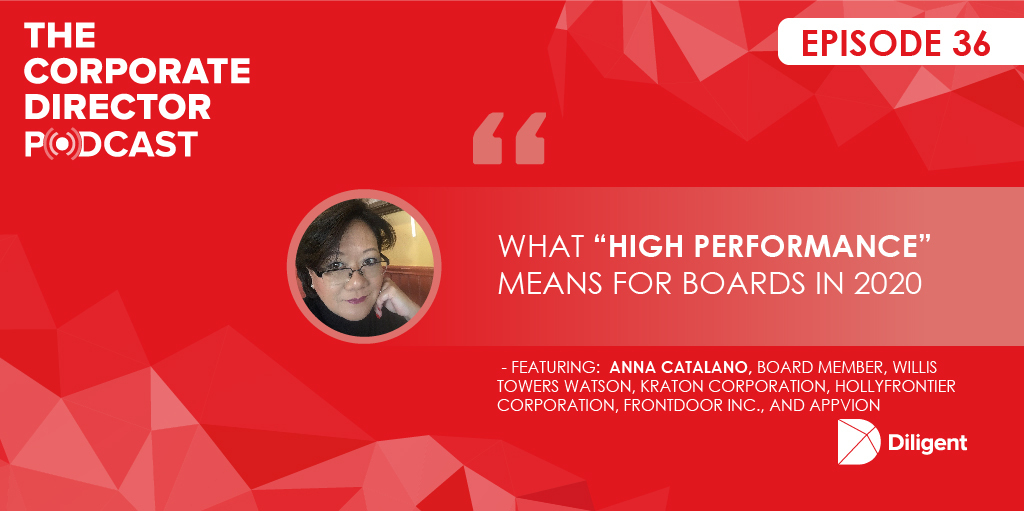What Does it Mean to Build a “High-Performance Board” in 2020?
Listen to Episode 36 on Apple Podcasts
Guest: Anna Catalano, board member, Willis Towers Watson, Kraton Corporation, HollyFrontier Corporation, Frontdoor Inc., and Appvion
Hosts: Dottie Schindlinger, Executive Director of the Diligent Institute, and Meghan Day, Senior Director of Board Member Experience for Diligent Corporation
In this episode:
- Preparedness is the new future-proof. While it’s impossible to predict the future, companies can prepare for change with stress tests and the right leadership.
- Wisdom through experience—and continuous learning. Look beyond pedigrees and titles to experiences and the skills you need, Catalano advises.
- Strength in numbers—and culture. Collegiality is important but so is healthy challenge.
Summary
What does a high-performing board look like in 2020, already a year like no other?
To gain some insights, podcast co-host Meghan Day talks to a particularly busy director: Anna Catalano.
Not only does Catalano serve on the boards of Willis Towers Watson, Kraton Corporation, HollyFrontier Corporation, Frontdoor, Inc., and Appvion, she is a certified Board Leadership Fellow of the National Association of Corporate Directors as well as president of its Texas/Tri-Cities Chapter and board member for the Alzheimer’s Association and the Houston Grand Opera.
In this episode, she shares her reflections from these varied experiences on how today’s boards can stay ahead of crisis and change.
Preparedness is the new future-proof
“We thought it would only be a few months but then the pandemic stuck around,” According to Catalano, this spurred corporations to rethink and reexamine the changes and pivots they needed to make.
While it’s impossible to predict the future, it’s feasible—and critical—to be prepared, she says. For boards, this means the capability to pressure test a corporation, plus the right leadership to navigate the pace of change.
“Ensure you have the depth of leadership for not only maintaining today’s performance needs but tomorrow’s,” Catalano advises.
“Disruption is happening so quickly that it’s really important to have that strategic insight.”
– Anna Catalano, board member, Willis Towers Watson, Kraton Corporation, HollyFrontier Corporation, Frontdoor Inc., and Appvion
Wisdom through experience and continuous learning
To assemble the appropriate mix of perspectives, capabilities, and experiences, Catalano recommends a skills matrix. “It can be functional, operational, geographical, by industry,” she says. Whatever the specific metrics, the board needs the right voices around the table to discuss where the company plans to go and the goals it wants to accomplish. Furthermore, she emphasizes, the board’s demographics need to represent both the company’s customer base and employees.
When evaluating future board members, Catalano says she prioritizes board members’ experiences over pedigrees and prestigious titles. “What you really want in the board room are a group of people who have been through a lot of different things,” she says. This way, “whatever an executive team is faced with, they can look around that board table and find someone who knows how to think it through.”
Her advice for individual board members? Keep learning.
“It’s very important for directors to stay current on what’s going on in the business world, with emergent populations in the workforce, the latest news and the latest things that are changing consumer behaviors,” she says. “Staying current and staying relevant is really important.”
“Directors who are not continuous learners are going to find themselves in trouble in the coming years.”
– Anna Catalano, board member, Willis Towers Watson, Kraton Corporation, HollyFrontier Corporation, Frontdoor Inc., and Appvion
Strength in numbers and culture
“Strength in the board room comes not only from individual board members, it’s really the combined strength of the entire board,” Catalano emphasizes.
How do you build board cohesion? Focus conversations on the future, not the past, she advises.
“When you think about it, board directors often look at information that’s backwards, historical performance, numbers, measurements, things like that.” Rather, reframe this conversation from rote reporting of the previous quarter to a more strategic examination of indicators.
“Based on results, did we know something was going to happen? Should we have seen it coming? How can make sure this happens more often, or less often if it’s not something we wanted?”
Mutual respect is one of the most important things to facilitate in strategic conversations, Catalano says. This starts with culture and extends beyond mere collegiality.
“It’s very important to have a good cultural fit with boards only meeting four to six times a year and meeting virtually more often,” she says.
High-performing boards also require healthy challenge when board members disagree about where things are going.
“How do you build that collegiality but at the same time a collegiality of being willing to push each other?” Catalano asks. “No one likes to feel uncomfortable, so how do you lean into that so you’re able to drive change in a meaningful way?”
“Make sure there’s a lot of trust, a lot of collegiality, but also healthy challenge.”
– Anna Catalano, board member, Willis Towers Watson, Kraton Corporation, HollyFrontier Corporation, Frontdoor Inc., and Appvion
Listen to Episode 36 on Apple Podcasts
Also in this episode . . .
Catalano talks about how organizations like NACD and the World Innovation Network, which she co-founded, keep her inspired.
“We bring together all kinds of people from different walks of life—corporate, entrepreneurs, from the arts, military, governments, start-ups–in a way that really exercises the brain in terms of innovation and different ways of thinking about things,” she says. “I find myself tremendously inspired talking to people who spend their days in very different orbits than I do.”
Catalano also suggests a book about leadership grounded in English Premier League soccer: Mentality Monsters: How Jürgen Klopp Took Liverpool FC From Also-Rans To Champions of Europe. Day, a Tottenham fan, has mixed feelings about this reading recommendation.


